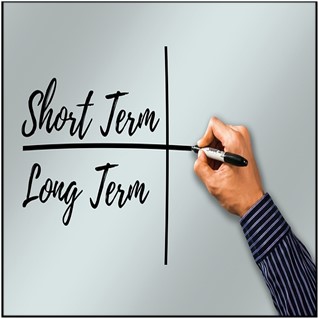By Marc C. Shaffer
Retirement. It is arguably one of the most talked about “goals” people save for, so much so, that short term goals can often get overlooked. Short term and long-term goals are not the same and treating them the same could mean some important considerations might be missed.
Short-term goals are those that are generally achieved around a five-year mark, though some could happen sooner or slightly further into the future. Some common short-term goals include:
- Building an Emergency Fund
- Saving for a Vehicle
- Saving for a Vacation
- Saving for a Home
- Creating/Funding a Tax Escrow Account
We are often asked what to do with money that is earmarked for these shorter-term goals. A main factor in the answer depends upon the person’s risk tolerance level and willingness to take on additional equity exposure in an attempt to generate a higher return. However, when you are saving for a shorter-term goal with the knowledge that you will be using those funds in the near future, one consideration might be to limit or avoid the potential volatility of equities for these short-term goals.
As many know, an equity market plunge could take months or years to recover from, which may have a more significant impact on short-term goals.
This strategy demonstrates one of the basic tenets of investing: high returns typically require a willingness to take on more risk, while low returns often come with the comfort of low volatility.
Safety; liquidity; returns: it’s been said that you can choose two of the three but cannot have all three. Fortunately, there are ways to invest the money for your shorter-term goals in an attempt to garner a higher yield than the interest rate at your local bank, albeit with a small amount of risk and downside potential.
Online Savings Account or Money Market Account
NerdWallet’s current analysis shows annual percentage yields for high-yield online savings accounts and money market accounts paying between 0.4% and 0.6%.
This may not sound like much, but it’s higher than 0.05%, the current national average interest rate on savings accounts, according to the Federal Deposit Insurance Corp. — and what you’ll likely be offered at your hometown branch. Some online savings accounts or money market accounts include the following:
- Chase
- American Express
- Discover Bank
- SoFi
- Ally Bank
Both savings and money market accounts are FDIC-insured, meaning your money is protected in the event of a bank failure up to $250,000 per institution, per depositor.
Diversified Debt Security Portfolio
We currently offer a portfolio that is invested 100% in debt securities, cash and/or cash equivalents. This includes a diversified portfolio of bond mutual funds and/or exchange traded funds, which is a loan to a company or government that pays back either a fixed or variable coupon payment (interest paid on the loan).
As a reminder, bonds are typically considered safer investments than equities for short term savings, but they still have risks. The borrower could default and when interest rates go up, bond values typically go down. To reduce the risk of default, we actively manage this portfolio of debt securities to minimize risk by reviewing and implementing different strategies including credit quality, bond type, duration (sensitivity to interest rate changes) and maturity.
If you would like to learn more about this portfolio, please let us know.
The method you choose for reaching your short-term goals will vary based on your specific situation but consider bringing these goals up to your financial advisor if you are not already talking about them. Every piece of your financial puzzle is important, a professional can help you maximize your potential for success.

